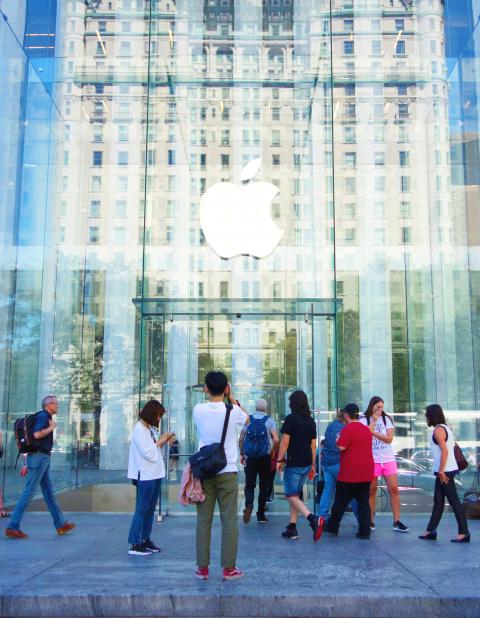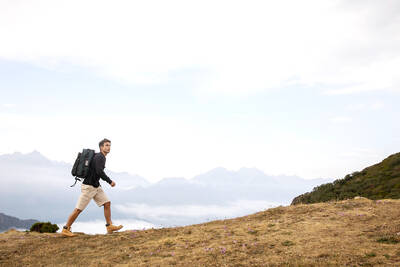Apple Inc is rumored to have selected Taipei 101 as the location for the company’s first Apple Store in Taiwan. According to the source of the rumor, the store, which will be directly operated by Apple, will occupy a 1,322 square meter retail unit that straddles the first floor and basement level one of the building, located next to the cosmetics concessions off Xinyi Road. Meanwhile, authorized Apple retailer, Studio A, last Monday withdrew from its retail store in basement level one of Taipei 101.
Precisely when the Apple Store will open for business and the exact size of the store are still both unclear at this stage.
Studio A president Cheng Ying-lung has revealed that the sudden decline in Chinese visitors to Taiwan caused a significant shock to the company’s flagship store in Taipei 101 with sales this year having declined 70 percent on last year’s figures.

Photo: AFP
照片:法新社
When asked how Studio A plans to compete with the Apple Store once it arrives in Taiwan, Cheng says in recent years Studio A has been actively building up its membership business, expanding its deep presence at school campuses, and has already amassed a large membership base.
(CNA, translated by Edward Jones)
根據傳聞,蘋果直營店Apple Store登台地點將為台北一○一,且店面將包含購物中心一樓靠信義路化妝品區及地下一樓上下二層,占地四百坪。而原本在一○一地下一樓的經銷體系晶實科技(Studio A)上週一已撤離。
至於蘋果直營店何時進駐開幕、店面規模多大並不清楚。
晶實科技總經理程應龍透露,陸客急凍,對晶實科技台北一○一旗艦店的確造成不小衝擊,今年業績跟去年同期相比掉了七成。
面對蘋果直營店進駐台灣的競爭,程應龍表示,晶實科技近年來積極朝向經營會員及校園深耕發展,已經累績相當數量的會員。
(中央社)

★ Bilingual Story is a fictionalized account. 雙語故事部分內容純屬虛構。 “Get in. It’s pouring.” She slid into the back seat, drenched and silent. “Tissues?” the driver asked. “No, thank you,” she said. Water beaded off her hair, ran from her coat, and made a small lake on the vinyl. She kept her head down, long black strands clinging to her face. “Where to?” She gave an address. “Funeral?” he asked as they slipped into the Xinhai Tunnel, rain fading to a hollow drum. She glanced up, puzzled. “No. Why?” “Crematorium’s about the only thing here.” He caught her eyes in the mirror.

Have you ever dreamed of hiking Taiwan’s majestic Mt. Jade or visiting Peru’s breathtaking Machu Picchu? These adventures sound amazing, but there’s something you should know about first: “altitude sickness.” This condition strikes when you climb to a higher elevation too quickly. The higher you go, the thinner the air becomes, making it harder for your body to absorb oxygen. The symptoms usually begin within hours of reaching high altitudes — about 2,500 meters or higher. You might experience headaches, dizziness, nausea, shortness of breath, or extreme fatigue. These symptoms can last for several days. The severity of altitude sickness varies

A: Any fun events happening this weekend? B: Boyband Energy’s concerts and Taiwan’s first major male dance revue have both sparked anticipation recently. A: Energy staged a comeback last year — 15 years after they disbanded — and they’re now more popular than ever. B: Their megahit “Friday Night” even won Song of the Year at the Golden Melody Awards. A: To pay tribute to the Queen of Pop Madonna, they added her choreography of 16 continuous jump squats to their music video, prompting a “16-squat challenge” that went viral across Taiwan. Do you wanna try it out? A:

Week 24 詞法—名詞 1. 人們一致稱讚他。 ˇ People praised him unanimously. χ Peoples praised him unanimously. 註:people 作「人們」(= men and women)解時,是單數形式,作複數用。peoples 是「多個民族」、「各國人民」,不是「多數人」,如 the peoples of Asia(亞洲各民族、亞洲人民)。 2. 她為他做了一條新褲子。 ˇ She made him a new pair of trousers. χ She made him a new trousers. 註:scissors 和 trousers 等名詞習慣用複數形式。「一把剪刀」或「一條褲子」正統說法為 a pair of scissors 或 a pair of trousers。 3. 我們提前兩年完成了第二個五年計劃的主要目標。 ˇ We fulfilled the major objectives of the Second Five-Year Plan two years ahead. χ We fulfilled the major objectives of the Second Five-Years Plan two years ahead. 註:five-year 作為一個複合形容詞,year 不用複數。又如 a twelve-year-old boy、a five-dollar note、a one-hundred-meter race 等,也是一樣。 4. 他們決定買一輛新車。 ˇ They have made up their minds to buy a new car. χ